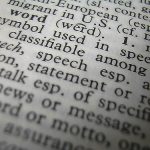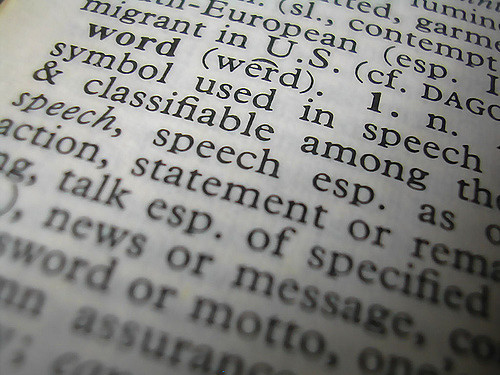
Image Credit:
So let’s spend a moment or two thinking about the next speech that you will be giving. You are going to be sitting down to create a speech and all that you are going to have to work with will be words to convey the importance of public speaking. What this means for you is that you are going to want to very carefully choose the words that you believe will allow you to get your message across to your audience as powerfully as possible. What you have laid out before you will be the types of words that we use every day: nouns, verbs, adjectives, adverbs, etc. Which ones should you use?
Your Speech Is Really A Meal
Let’s face it: writing out a speech is never an easy thing to do. We often have a great deal that we want to say and yet, we’re not exactly sure how we want to go about saying it. We can get advice from famous people who have written really memorable speeches. What these people tell us is that they believe that when we are writing our speeches, we need to stay away from using too many adjectives and adverbs. What do they think that we should be doing instead? They think that the use of more specific, vivid, and descriptive verbs and nouns will allow us to create stronger speeches while keeping them streamlined at the same time.
One way to view creating a speech is like creating a meal for your audience. In this meal that you are preparing, the verbs and nouns that you work into your speech which will take the place of your main course. As with any real meal that you might prepare, your verbs and nouns will now get the most focus from you. What we need to realize is that if our verbs and nouns are both flat and flavorless, then any other words that we use in our speech will not be able to salvage the meal.
Let’s take an example. Say that you wanted to tell your audience that you “got to the office before my boss got mad”. With careful selection of the right verbs and nouns this can be changed to “dashed into work before my boss blew his top”.. The rewrite is both more powerful and pithier. Your audience will now be able to do a better job of picturing the scene that you have presented them with. If when you are creating your speech you select verbs and nouns that you know will appeal to your audience’s senses, actions, thoughts, and emotions then you will be able to draw them into your speech.
Take Time To Sharpen Your Speech
So, how can we use this information in order to write better speeches? The first thing that we can do is the next time that you are working on creating a speech, take time to take a close look at what you are writing. What you are going to want to do is to look for ways to sharpen the word choices that you are making. This means that when it comes time to choose a word, you are going to want to steer yourself clear of words that are generic, vague, or simply humdrum.
There will come times when either a verb or a noun that you have used just does not seem to be able to do the trick by itself. When you find yourself in a situation like this, you may be tempted to modify a verb with an adverb or a noun using an adjective. The reason that you would want to do this would be to find a way to emphasize a specific point that you are trying to make. In a situation like this, it may be best to sit back for a moment, and think to yourself. Is there a way that of doing something else instead of adding additional words that may just confuse your audience? An alternative approach might be to look for ways to substitute a stronger verb or noun. Doing this would allow you to do away with the extra adverb or adjective that you were thinking about adding.
When we find ourselves in situations where we want to swap out one word for another, it can be difficult for us to think of the word that we really want to use. When we run into a situation like this, we need to think back to high school and what our English teacher told us to do. This is the time that we need to go and find a thesaurus. A thesaurus is what you are going to need in order to do some brainstorming in order to find replacement words. Take the time to study all of your alternatives and then in the end select the one that you feel will paint the clearest image for your audience.
What All Of This Means For You
When we prepare to create a speech, we start to understand how little we have to work with – just words to use to show the benefits of public speaking. How we choose the words that we are going to use all of sudden becomes even more important when we start to understand that this is how we are going be able to connect with our audience. We’ve got lots of different types of words that we can use: verbs, nouns, etc. Which ones should we select?
When we are creating a speech, we need to listen to people who have come before us and created lasting memorable speeches. What they tell us to do is to make sure that we don’t over use adjectives and adverbs. Instead they tell us to focus on our verbs and nouns. If we view creating a speech like creating a meal, then our verbs and nouns make up our main dish and we need to make sure that they are full of flavor or the rest of the meal will suffer. Our goal has to be to use words that will allow our audience to clearly picture the scene that we are trying to draw for them. When we are creating a speech, we need to take the time to sharpen our speech and minimize the number of adjectives and adverbs that we use. If we get stuck on trying to come up with a more descriptive noun or verb, then we can always reference a thesaurus.
As speakers it is our job to paint vivid pictures with the words that we use in our speeches. In order to make this happen, we need to take the time to pick our words carefully, especially the verbs and nouns that we choose to use. We need to be careful to not overload our speech with too many adverbs or adjectives. Instead, carefully selecting verbs and nouns that will resonate with our audience will allow us to create streamlined speeches that can be used to deliver a powerful message.
– Dr. Jim Anderson
Blue Elephant Consulting –
Your Source For Real World Public Speaking Skills™
Question For You: How often do you think that you should rely on adjectives and adverbs to help out your nouns and verbs?
![]() Click here to get automatic updates when The Accidental Communicator Blog is updated.
Click here to get automatic updates when The Accidental Communicator Blog is updated.
P.S.: Free subscriptions to The Accidental Communicator Newsletter are now available. Subscribe now: Click Here!
Note: What we talked about are advanced speaking skills. If you are just starting out I highly recommend joining Toastmasters in order to get the benefits of public speaking. Look for a Toastmasters club to join in your home town by visiting the web site www.Toastmasters.org. Toastmasters is dedicated to helping their members to understand the importance of public speaking by developing listening skills and getting presentation tips. Toastmasters is how I got started speaking and it can help you also!
What We’ll Be Talking About Next Time
The next time that you are asked to host a panel session, are you going to be ready? We all understand the importance of public speaking and as speakers what we need to do in order to both grab and then keep the attention of our audience. However, with a panel session, even if you have done everything that you can think of to get ready, the final result might still be something skips over the benefits of public speaking and ends up putting your audience to sleep. What can a speaker do?

